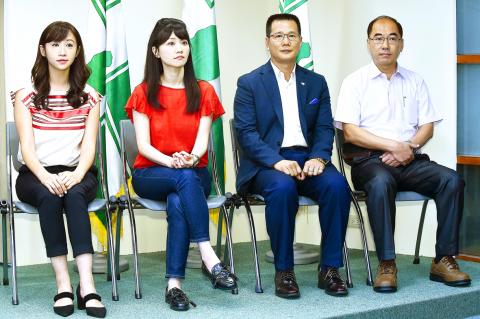The Democratic Progressive Party’s (DPP) yesterday nominated five candidates for next year’s legislative elections, triggering controversy after the party’s headquarters apparently snubbed Taipei City Councilor Wang Shih-chien (王世堅), who had been seen as a popular choice.
Three prominent women were given the nod: Taipei City councilors Kao Chia-yu (高嘉瑜) and Hsu Su-hua (許淑華) — for races in Taipei’s fourth and seventh electoral districts respectively — along with Legislator Hsiao Bi-khim (蕭美琴), who is to seek re-election to her Hualien County seat.
DPP Secretary-General Luo Wen-jia (羅文嘉) said that Chen Kui-yu (陳癸佑) and Luo Kuei-hsing (羅貴星) would contest legislative seats in Nantou County and Miaoli County respectively.

Photo: Chen Chih-chu, Taipei Times
A lot of attention has been given to the DPP’s promotion of Kao and Hsu from city councilor seats to the legislative races.
Kao, a regular on political talk shows, thanked the DPP for giving the opportunity to a young woman like her, even though she has been embroiled in some controversies and faced criticism from other party members.
“It shows that within the DPP is a vibrant and diverse democracy, and able to accept different opinions and ideas... Our party will face tough battles, but together we can weather the storms and win the upcoming election,” she said.
Her nomination was criticized by some DPP members as a bid to curry favor with Taipei Mayor Ko Wen-je (柯文哲), as Kao is seen as a “Ko-friendly” city councilor, while Wang, who has widespread grassroots support, is an outspoken critic of Ko.
Wang has developed a reputation as “commander-in-chief of Ko-hater army,” as his frequent clashes with the mayor have won him much airtime and helped make him a household name.
However, Hsu said that she and Kao have worked hard in Taipei for the DPP, helping it consolidate support in the city.
As young women, they took on the tough Taipei districts more than a decade ago, and they have been praised for their hard work and diligent efforts, she said.
Hsu is to face a challenge in Taipei’s seventh electoral district, which includes Xinyi (信義) and the south part of Songshan (松山) districts, as she is to face Pan Ho-hsun (潘厚勳), whom the Taiwan Solidarity Union nominated yesterday, for “deep green” votes.

A preclearance service to facilitate entry for people traveling to select airports in Japan would be available from Thursday next week to Feb. 25 at Taiwan Taoyuan International Airport, Taoyuan International Airport Corp (TIAC) said on Tuesday. The service was first made available to Taiwanese travelers throughout the winter vacation of 2024 and during the Lunar New Year holiday. In addition to flights to the Japanese cities of Hakodate, Asahikawa, Akita, Sendai, Niigata, Okayama, Takamatsu, Kumamoto and Kagoshima, the service would be available to travelers to Kobe and Oita. The service can be accessed by passengers of 15 flight routes operated by

Alain Robert, known as the "French Spider-Man," praised Alex Honnold as exceptionally well-prepared after the US climber completed a free solo ascent of Taipei 101 yesterday. Robert said Honnold's ascent of the 508m-tall skyscraper in just more than one-and-a-half hours without using safety ropes or equipment was a remarkable achievement. "This is my life," he said in an interview conducted in French, adding that he liked the feeling of being "on the edge of danger." The 63-year-old Frenchman climbed Taipei 101 using ropes in December 2004, taking about four hours to reach the top. On a one-to-10 scale of difficulty, Robert said Taipei 101

Taiwanese and US defense groups are collaborating to introduce deployable, semi-autonomous manufacturing systems for drones and components in a boost to the nation’s supply chain resilience. Taiwan’s G-Tech Optroelectronics Corp subsidiary GTOC and the US’ Aerkomm Inc on Friday announced an agreement with fellow US-based Firestorm Lab to adopt the latter’s xCell, a technology featuring 3D printers fitted in 6.1m container units. The systems enable aerial platforms and parts to be produced in high volumes from dispersed nodes capable of rapid redeployment, to minimize the risk of enemy strikes and to meet field requirements, they said. Firestorm chief technology officer Ian Muceus said

MORE FALL: An investigation into one of Xi’s key cronies, part of a broader ‘anti-corruption’ drive, indicates that he might have a deep distrust in the military, an expert said China’s latest military purge underscores systemic risks in its shift from collective leadership to sole rule under Chinese President Xi Jinping (習近平), and could disrupt its chain of command and military capabilities, a national security official said yesterday. If decisionmaking within the Chinese Communist Party has become “irrational” under one-man rule, the Taiwan Strait and the regional situation must be approached with extreme caution, given unforeseen risks, they added. The anonymous official made the remarks as China’s Central Military Commission Vice Chairman Zhang Youxia (張又俠) and Joint Staff Department Chief of Staff Liu Zhenli (劉振立) were reportedly being investigated for suspected “serious